AI Pastor: Can Artificial Intelligence Preach?
Explore how the AI Pastor concept is reshaping modern ministry. From sermon generation to virtual counseling, discover the technologies, ethics, and real-world uses of AI in faith. Learn how Scrile AI helps churches build their own custom digital pastors — blending technology, compassion, and community.
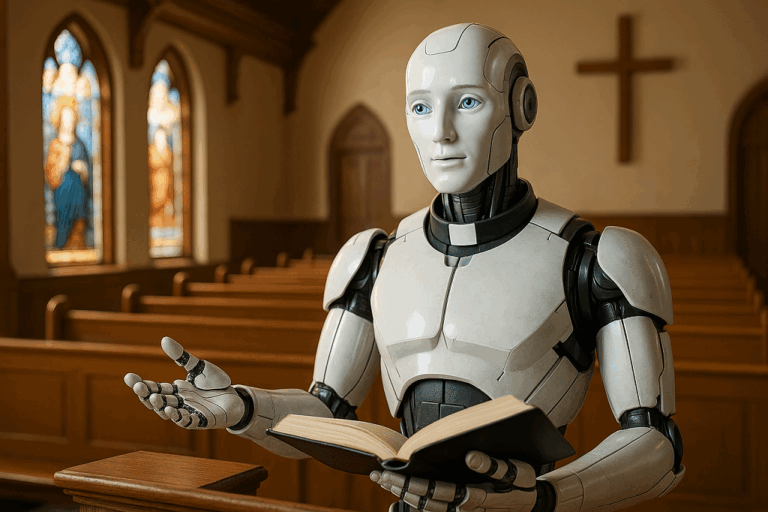
ai for pastors
People used to walk into a church to ask hard questions. Now they type them into a chat window. “Why do I feel distant from God?” “How should I pray?” “Can faith survive doubt?” The answers might come not from a pastor sitting across the table but from a program — an AI pastor built to listen, reflect, and respond.
Over the past year, faith-based chatbots like AI Pastor have started showing up in people’s phones and browsers. They quote scripture, write sermon drafts, and even guide small moments of prayer. Some users treat them as study companions; others see them as quiet mentors between Sunday services.
Churches are paying attention. Clergy numbers are shrinking, online congregations are growing, and believers speak dozens of languages. For many communities, an AI assistant is a way to stay connected when a human pastor can’t always be there.
This article looks at where that idea is headed — what digital pastors can already do, how the technology behind them works, and why some believers welcome them while others hesitate. And near the end, we’ll look at Scrile AI, a service that helps churches build their own faith-based assistants from the ground up.
The Idea of an AI Pastor and Why It’s Needed
An ai pastor is a digital assistant designed to speak the language of faith. It’s built on artificial intelligence systems trained on theology, scripture, and real pastoral conversations. Instead of automating prayer or replacing clergy, it’s meant to extend spiritual guidance into the places where people already spend their time — phones, chat apps, and websites.
The idea didn’t appear overnight. Early “Bible bots” on Facebook Messenger could quote verses on command. Then came sermon generators that helped preachers organize ideas. Prayer apps followed, offering personalized devotionals. The difference now is how sophisticated these tools have become — they can interpret tone, answer layered questions, and even adapt to different denominational styles.
How the Idea Reached the Pulpit
In recent years, a few churches experimented with AI-led sermons. In 2023, a church in Germany hosted a service where a chatbot delivered the sermon to about 300 people. The congregation’s reactions were split — some found it creative, others said it felt detached. Similar projects have been tested in Japan, where declining clergy numbers have pushed temples and churches to explore virtual assistance for prayer and ritual reading.
Demand keeps rising, and the reasons are practical:
- Pastor shortages and burnout. Many ministers handle multiple congregations or administrative duties.
- Growing online ministries. Virtual worship and livestreams create new spaces where guidance is expected on demand.
- Younger believers. Many connect with their faith digitally before ever stepping into a church.
Imagine a small rural congregation that only sees its priest on weekends. During the week, an ai pastor sends out devotionals, answers scripture questions, and leads short prayers through a tablet on the church altar. The priest reviews the interactions later and uses them to prepare for Sunday service.
Technology like this doesn’t change what people believe. It simply makes spiritual guidance easier to reach when human pastors can’t be everywhere at once — a quiet bridge between faith and access.
Possible Scenarios: Sermons, Advice, Answers
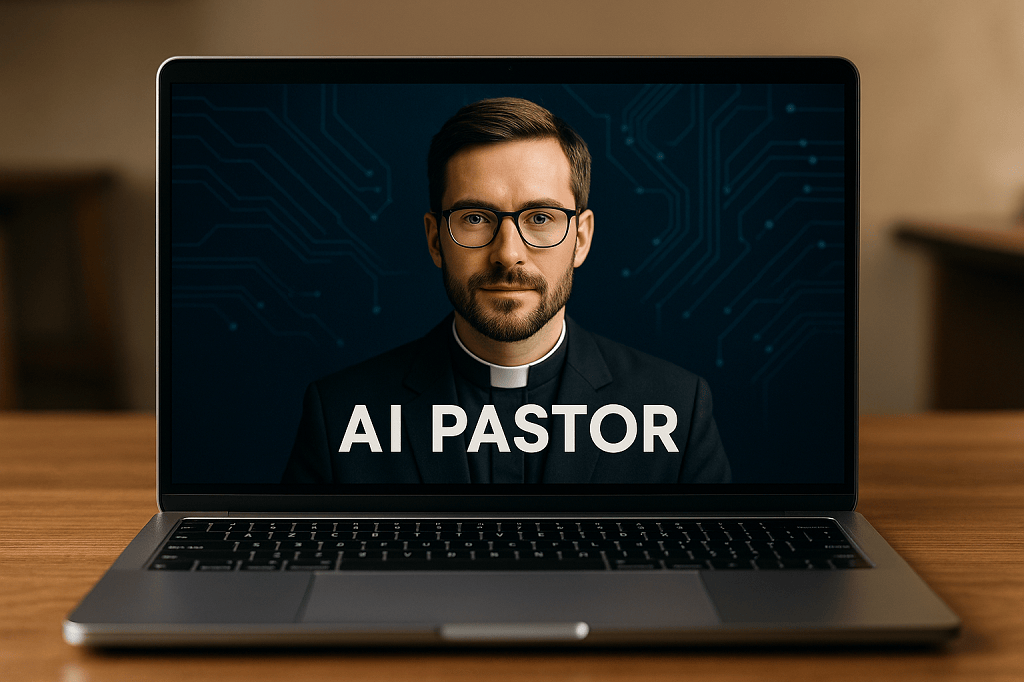
Imagine waking up on Sunday morning and finding your sermon already outlined. The verses fit the theme, the context is clear, and the transitions make sense. It’s not magic — your AI Pastor spent the night helping you build it. You still add stories, adjust tone, and shape the message, but the hardest part — getting started — is already done.
What AI Can Actually Do for Ministry Work
AI tools now help pastors with everything from writing to listening. They take care of background work, leaving the human side of ministry — empathy, presence, prayer — untouched. Here’s what they handle best:
- Sermon drafts and inspiration. An AI preacher can pull verses, create outlines, and offer contextual notes that save hours of prep time.
- Counsel and prayer chat. Chatbots trained in pastoral language can offer comfort and scripture when someone reaches out in the middle of the night.
- Multilingual outreach. Churches stream in multiple languages; AI translates in real time without losing the tone or rhythm.
- Faith education. Bible study assistants answer theological questions tailored to denominational perspectives.
- Admin support. Event reminders, attendance summaries, and scheduling happen quietly in the background.
Pastor AI projects like SermonSpark help ministers organize their week, while Pastors AI tools make it easy to turn long sermons into short devotionals or posts for social media. These assistants don’t replace the message — they protect the time and energy needed to share it.
The best AI for pastors works quietly, learning from feedback, adapting to tone and tradition. Some results still feel robotic, but others sound deeply familiar — like a colleague finishing your sentence. It all depends on how the system is trained and who shapes its voice.
Used well, these tools extend the reach of ministry. They remind pastors that their calling doesn’t have to compete with exhaustion — that even technology, when guided by faith, can serve the work instead of stealing from it.
Technologies Behind Religious AI Services
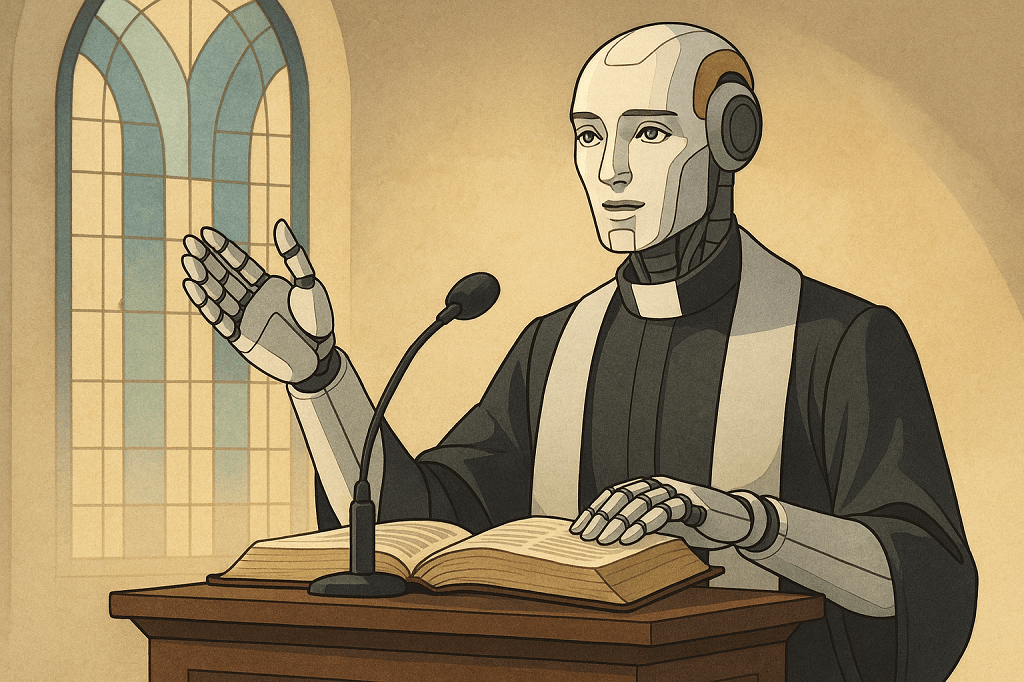
Behind the calm, steady voice of an AI Pastor, there’s an intricate blend of engineering and ethics. It might look like a friendly chat window or a soft-spoken voice on a Sunday livestream, but the system that makes it possible is a complex web of machine learning models, linguistic frameworks, and moral safeguards. The goal isn’t to imitate faith — it’s to translate it into a form that feels approachable, respectful, and safe.
When developers design a spiritual AI, they’re not just coding a chatbot. They’re building something that must speak with care, avoid theological distortion, and respond like a teacher who also listens. That combination demands multiple layers of technology working in sync.
Core Technologies That Shape an AI Pastor
To understand how these systems operate, it helps to picture them as orchestras, not solo instruments. Each layer contributes a different skill:
- Natural Language Processing (NLP). This is the heart of the operation — the part that interprets questions, extracts meaning, and connects them to appropriate biblical or theological references. Modern models like GPT or Llama can process context with extraordinary depth, but developers fine-tune them with sermons, commentaries, and pastoral dialogues to avoid generic or mechanical tone.
- Large Language Models trained on Scripture and commentary. Training isn’t just about feeding the Bible into a machine. Developers include scholarly interpretations, pastoral writings, and even denominational variations. This balance keeps responses both informative and spiritually sensitive.
- Text-to-Speech and Voice Synthesis. When an AI preacher speaks, tone matters as much as content. Synthetic voices now carry warmth, pauses, and breath — subtle signals that help listeners feel comforted rather than instructed. Some churches even record their own ministers to create digital voices that sound familiar to congregants.
- Sentiment and Context Analysis. Religious questions often hide emotion — fear, doubt, grief. The AI reads tone through text patterns and adjusts its phrasing accordingly. Instead of answering “God doesn’t love you,” it might say, “Let’s look together at what scripture says about feeling distant from God.” That difference is built into sentiment control systems.
- Privacy and Data Protection Modules. People share intimate details in prayer messages — confessions, struggles, requests. These AI tools store data in encrypted form or delete it automatically after a session. Some systems even work offline to prevent external tracking.
Guardrails That Keep Faith Tech Responsible
Technology can spread messages quickly, but faith requires accuracy and empathy. Developers have to ensure that no generated response misquotes scripture, promotes harmful advice, or crosses theological boundaries. Here’s how ethical “guardrails” are built into every Pastor AI system:
- Content filters flag or block theological distortions or offensive material.
- Human review cycles allow clergy or theologians to test AI responses before public release.
- Theological alignment layers make sure the chatbot’s interpretations match denominational values — Protestant, Catholic, Orthodox, or non-denominational.
- Context locks prevent the AI from generating claims about divine authority or performing “spiritual actions” like blessings or absolution.
These systems act as a moral compass inside the code. The aim isn’t to make AI sound divine — it’s to help it stay grounded, careful, and kind.
Comparison of Leading Religious AI Tools
Many of the faith-oriented systems available today share the same underlying principles but serve different purposes. Some focus on sermon preparation, others on spiritual counseling or education. Below is a simple overview of how they differ in function and scope:
| Tool | Main Function | Distinct Feature | Limitation | Best Use |
| AI Pastor | Delivers prayers, sermons, and personalized devotions | Uses fine-tuned GPT models on Christian texts | Still learning tone consistency | Daily engagement and spiritual Q&A |
| Pastors AI | Helps ministers repurpose and distribute content | Integrates with newsletters and podcasts | Focused mainly on outreach | Digital communication for church leaders |
| SermonSpark | Generates sermon drafts and contextual references | Links verses with historical interpretations | Produces draft-level ideas, not final scripts | Weekly sermon inspiration |
| Pulpit AI | Creates sermon transcripts and insights from recordings | Voice recognition and analytics | Limited customization | Archiving and sermon management |
Each of these uses the same family of real-time AI for pastors technologies but customizes them for a specific layer of ministry — communication, reflection, or teaching.
Why Technology Matters in Faith Work
Artificial intelligence can’t feel devotion, but it can help organize it. The technical progress behind these systems allows pastors to respond faster, prepare more thoughtfully, and engage their congregations in ways that match digital life.
The most meaningful breakthroughs aren’t about automation — they’re about tone. Developers spend weeks training AI preacher models to recognize empathy and avoid hollow answers. If someone types, “I’ve lost my faith,” the system must know how to comfort, not correct. That sensitivity depends on continuous testing, dataset diversity, and ethical oversight.
When these technologies come together — natural language understanding, privacy layers, voice, and context — they create tools that respect both belief and data. They can serve a congregation of fifty or fifty thousand, across languages and time zones.
And as churches begin to see how deeply digital communication is tied to modern faith, the conversation shifts from “should AI exist in ministry?” to “how can we shape it to reflect what we truly believe?”
Ethical Issues and Limitations
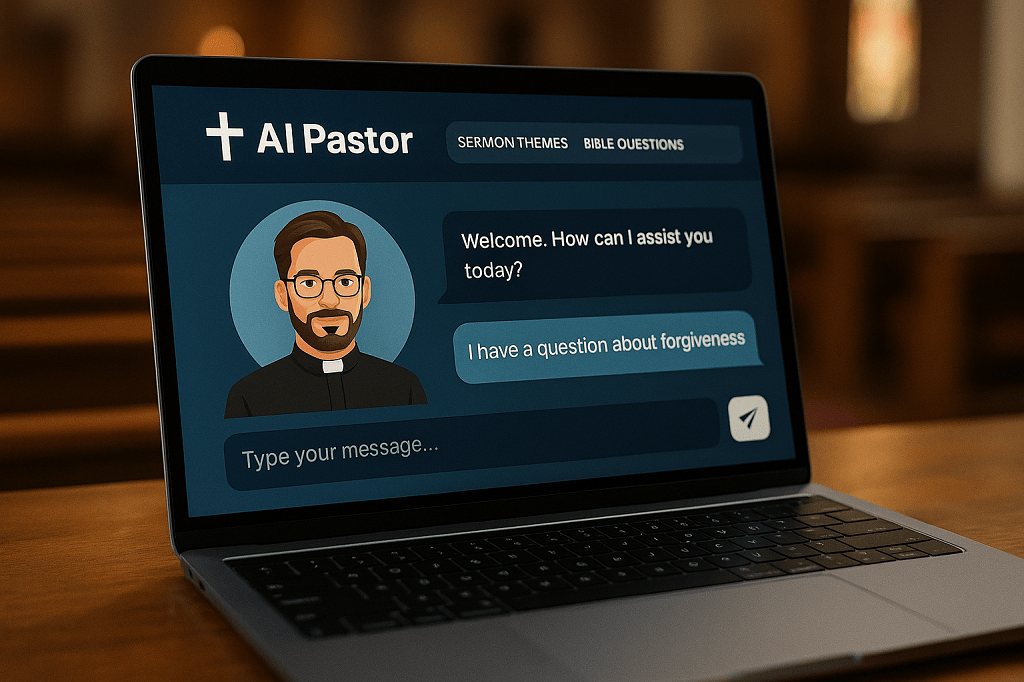
Even among those open to technology, the idea of an AI Pastor raises unease. Faith depends on empathy, and people question whether an algorithm can ever “feel” compassion or understand grief. The answer, so far, is no — but it can imitate care through tone and timing, offering presence when a person can’t.
Still, several challenges follow this new wave of digital ministry.
- Authenticity. A sermon written by code lacks the life behind lived faith. It can quote verses beautifully but misses the pulse of real experience.
- Authority. No machine should define doctrine. AI can clarify or organize ideas, but it should never preach as if it speaks for the divine.
- Privacy. Prayer chats often include personal confessions. Systems must encrypt or delete data to keep that trust sacred.
- Bias. If trained on limited sources, models might lean toward certain traditions or leave others unseen.
There are already examples. The “AI sermon” in Fürth, Germany drew 300 attendees; some applauded the experiment, others found it hollow. A few pastors say digital tools ease their workload yet thin the emotional bond with their congregations.
Used wisely, these technologies act as partners — helpful aides for outreach and reflection, never substitutes for human faith.
Launch an AI Service for Your Congregation with Scrile AI
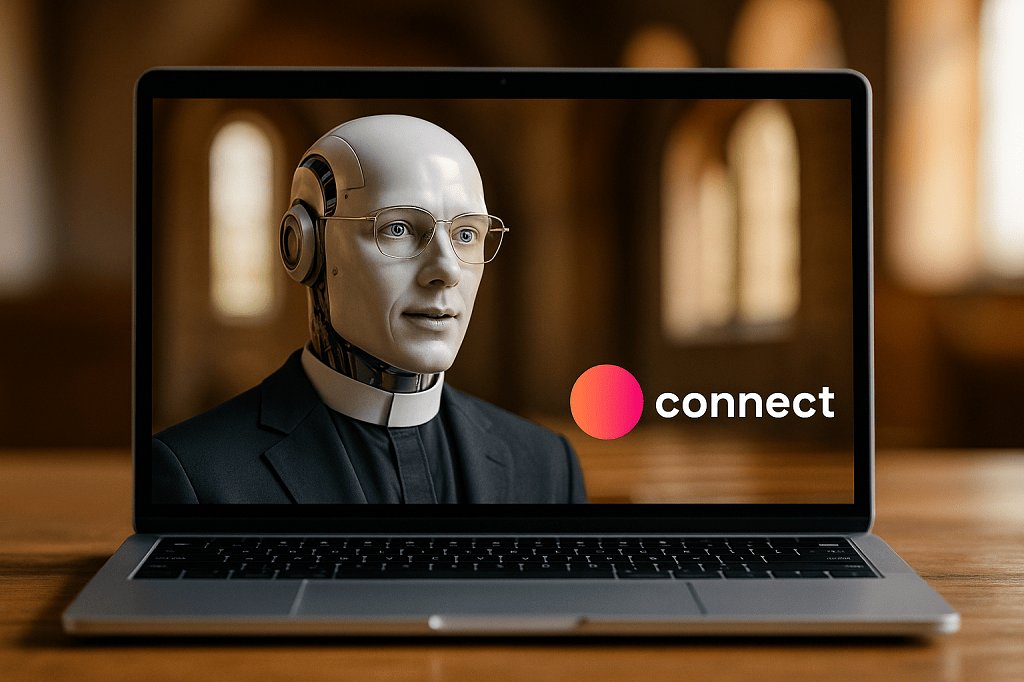
When general-purpose tools start showing their limits, the next step is building something that truly belongs to your community. That’s where Scrile AI comes in — not as another plug-and-play chatbot, but as a development service that helps organizations design their own faith-based assistants from the ground up. Every project begins with a simple idea: technology should serve your mission, not the other way around.
What makes Scrile’s approach different is the level of control and personalization it offers. Everything — from theological tone to visual identity — can be adjusted to match your congregation’s voice. The framework is flexible enough for a small parish or an entire church network.
Here’s what defines a Scrile-built AI Pastor:
- Ownership. You keep full control over code, data, and spiritual direction. Nothing is outsourced, nothing sold to third parties.
- Customization. The system’s tone, scripture base, and interaction style reflect your denomination, language, and worship culture.
- Integration. Prayer requests, sermon archives, donation pages, and internal analytics can all live in one ecosystem.
- Scalability. Infrastructure built for thousands of users joining simultaneously during livestreams or digital sermons.
- Privacy and safety. Conversations and prayer submissions are protected through strict encryption standards.
A recent example shows what this can look like: a church network commissioned a custom assistant through Scrile AI that greets members by name, shares daily devotionals, and stores private prayer notes visible only to the pastor. It works across web and mobile, blending intimacy with modern reach.
Scrile AI gives faith leaders the power to shape their own digital presence — one that respects belief, maintains trust, and grows with their mission. To explore a tailored AI Pastor for your congregation, contact the Scrile AI team and start building today.
Conclusion
The AI Pastor has moved from experiment to genuine ministry partner. What began as a curiosity now helps churches connect with people across languages, schedules, and screens. Technology can extend compassion, never replace it.
Used wisely, it strengthens faith communities and gives clergy time to focus on people, not paperwork. Those ready to explore what’s possible can reach out to the Scrile AI team and design a custom solution that joins innovation with purpose.
FAQ
What is the AI app for pastors?
Tools like SermonSpark and Pastors.ai help clergy prepare sermons faster, organize weekly content, and share messages online with less effort — saving valuable hours without losing personal touch.
Can pastors use AI?
Yes, and many already do. AI supports sermon planning, question handling, and data insights while respecting each leader’s theological and ethical boundaries.
Is AI okay for Christians?
Faith and technology can walk side by side. AI is a tool for communication and teaching — it assists ministry, but the calling remains deeply human.
Read also
| Article | Why it’s worth reading |
|---|---|
| Christian AI: How Technology Is Changing Faith in 2026 | This piece gives a broader view of how Christian projects already use AI for teaching, discipleship, and support, and which formats resonate best with believers. |
| Best Church Website Builders Compared in 2026 | As your community grows, you need proper infrastructure. This guide compares website builders tailored for churches, including donations, events, media archives, and member areas. |
| AI for Nonprofits in 2026: Boost Fundraising | Once your digital presence is set, fundraising becomes the next challenge. Here you’ll see how AI can segment donors, personalize outreach, and improve campaign performance for any nonprofit. |
| Digital Fundraising Strategy in 2026: Smart Tactics | This article ties everything together into a clear fundraising strategy: which channels to use, how to build funnels, and how to turn digital tools into a predictable revenue stream for your mission. |
